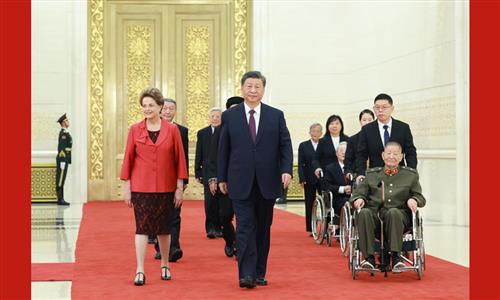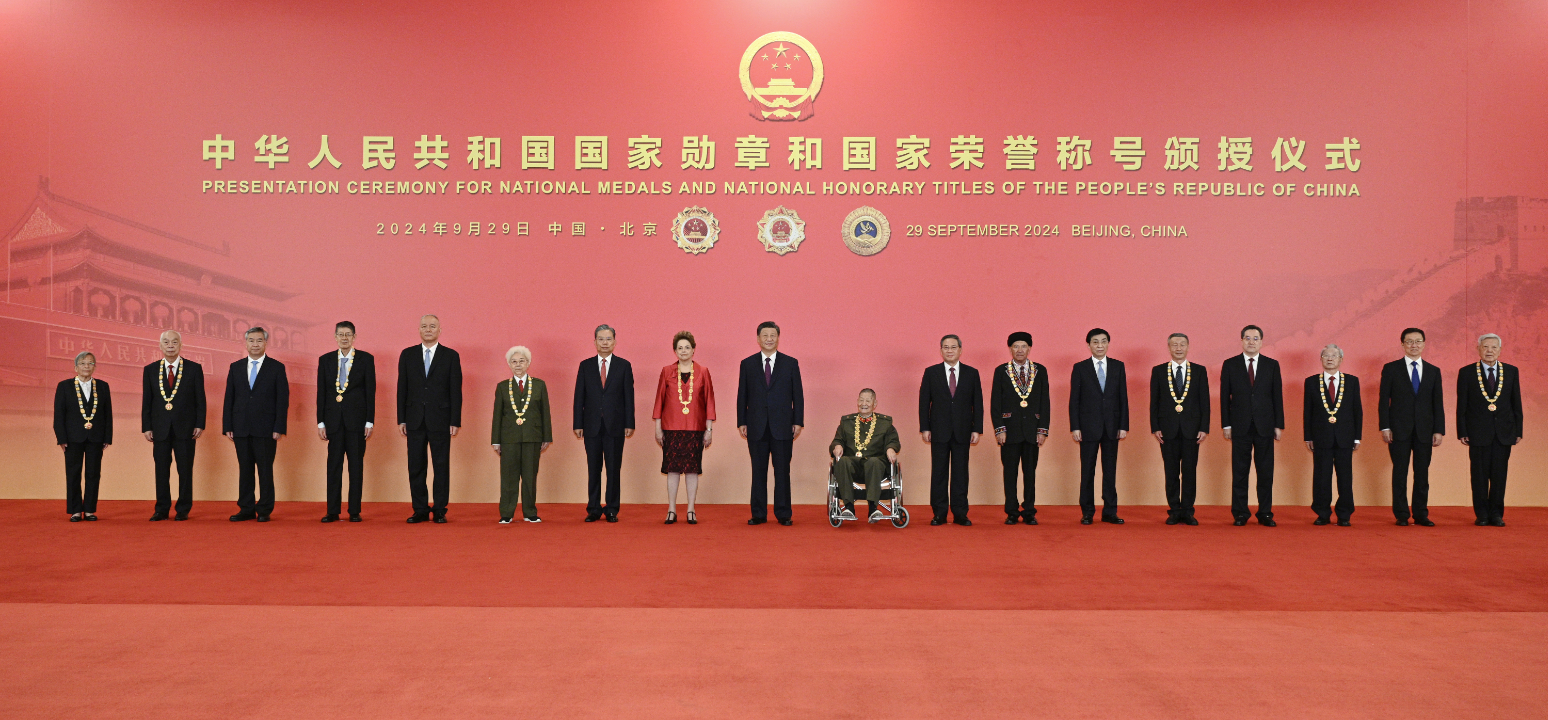
Chinese President Xi Jinping, also general secretary of the Communist Party of China Central Committee and chairman of the Central Military Commission, and other senior leaders, join the awardees for a group photo after presentation ceremony of the national medals and honorary titles of the People's Republic of China at the Great Hall of the People in Beijing on September 29, 2024. Photo: Xinhua
On September 29, China held a high-profile ceremony to bestow its highest state honors in celebration of the 75th anniversary of the founding of the People's Republic of China. Among the honorees, who stand as shining symbols of the national and contemporary spirit, were Wang Yongzhi, a visionary rocket expert and pioneer of China's manned space program, who posthumously received the prestigious Medal of the Republic, and Xu Zhenchao, a technician awarded the national honorary title of the "People's Craftsman."
"A great era calls for heroes and fosters heroes. A galaxy of heroes emerging generation after generation will ensure the lasting success of the Party and the people's cause," Chinese President Xi Jinping, also general secretary of the Communist Party of China (CPC) Central Committee and chairman of the Central Military Commission, noted in his address at the presentation ceremony of the national medals and honorary titles at the Great Hall of the People in Beijing.
From bustling container terminals to state-of-the-art satellite launch sites, various sectors have cultivated exceptional talent, driving Chinese modernization forward.
As China makes remarkable strides in technological development, a question arises: Who is answering the call for a stronger technological nation, and why?
The stories of Wang and Xu may provide some insights. One is a visionary scientist in the high-tech sector, gazing toward the stars, while the other is a dedicated front-line worker, grounded in the realities of hands-on labor. As the country prioritizes technological innovation and talent cultivation, they inspire the younger generation to embrace their responsibilities in this transformative era and pursue the dream of establishing the nation as a world leader in science and technology.
Reaching for the star
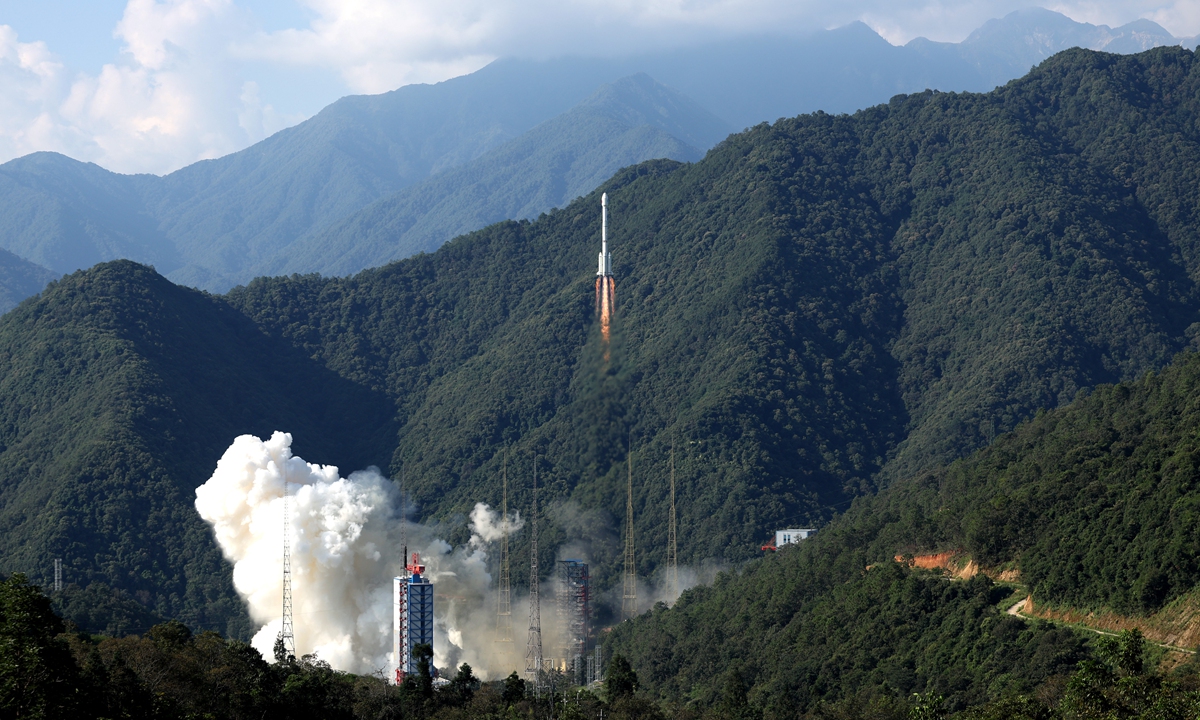
Two new satellites for the BeiDou-3 Navigation Satellite System are launched by a Long March-3B carrier rocket from the Xichang Satellite Launch Center in Southwest China's Sichuan Province on September 19, 2024. Photo: VCG
During the National Day holidays, some 400 kilometers above the Earth, the crew of Shenzhou-18 at the Tiangong space station engages in groundbreaking experimental projects. From their vantage point among the stars, they sent heartfelt birthday wishes to their motherland.
In Fuzhou, East China's Fujian Province, 86-year-old Huang Chunping, former chief commander of China's manned space program rocket system, shared his excitement with the Global Times about hearing the accolades emanating from the Great Hall of the People and inspiring news from China's space station.
Chinese scientists, backed by national support, who dare to explore and breakthrough technological bottlenecks, deserve the honor, Huang said firmly and proudly.
Wang's recognition prompted Huang to reflect on his 60 years of devotion to China's space sector. "Every advancement in cutting-edge technology is deeply valued by our country and the people," Wang noted.
Having collaborated closely on missile development and the Chinese manned space program, Huang regards Wang as his most respected mentor, who embodied a forward-thinking vision, a clear thought process, and unwavering loyalty to his motherland.
He shared with the Global Times that one of Wang's mottoes was "the needs of the nation are our ideals."
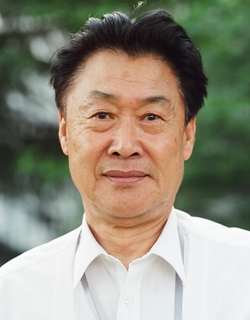
A file photo of Wang Yongzhi Photo: VCG
Inspired by a sense of duty, Wang pursued the study of aircraft, missiles, and rockets to contribute to his country's progress. In 1992, he became the chief designer of China's manned space program, facing the challenge of catching up to 40 years of foreign advancements in manned spaceflight. Over the next 11 years, Wang and his team overcame numerous technical hurdles. The successful Shenzhou-5 mission in October 2003 marked China's first entry into space.
"While some Western researchers often work under contract, Chinese scientists view their efforts as a 'national mission.' We firmly believe that our country needs us," Wang said.
In Wang's home, several stacks of old notebooks occupy his bookshelf. These notebooks, filled with densely written records about space exploration, are a collection of his work that spans more than six decades.
From these yellowed pages emerged China's proud achievements, such as the Dongfeng (DF) missile series, the Long March rocket series, and China's manned space missions, all of which have garnered increasing global attention.
Huang attributed these technological advancements to a "mutual commitment" between policymakers and scientists. In China, major advancements in national defense and space exploration are prioritized as key projects by the Party and the central government, fostering concentrated efforts for breakthroughs. This commitment empowers Chinese scientists to make bold decisions when faced with challenges.
Despite limitations in launch capabilities and engineering experience, China remained committed to its ambitions. Wang Yanan, chief editor of Aerospace Knowledge magazine, remarked that this perseverance reflects both wise strategic decisions and the resilience of the Chinese people, coupled with a deep respect for technological progress.
Down to the earth
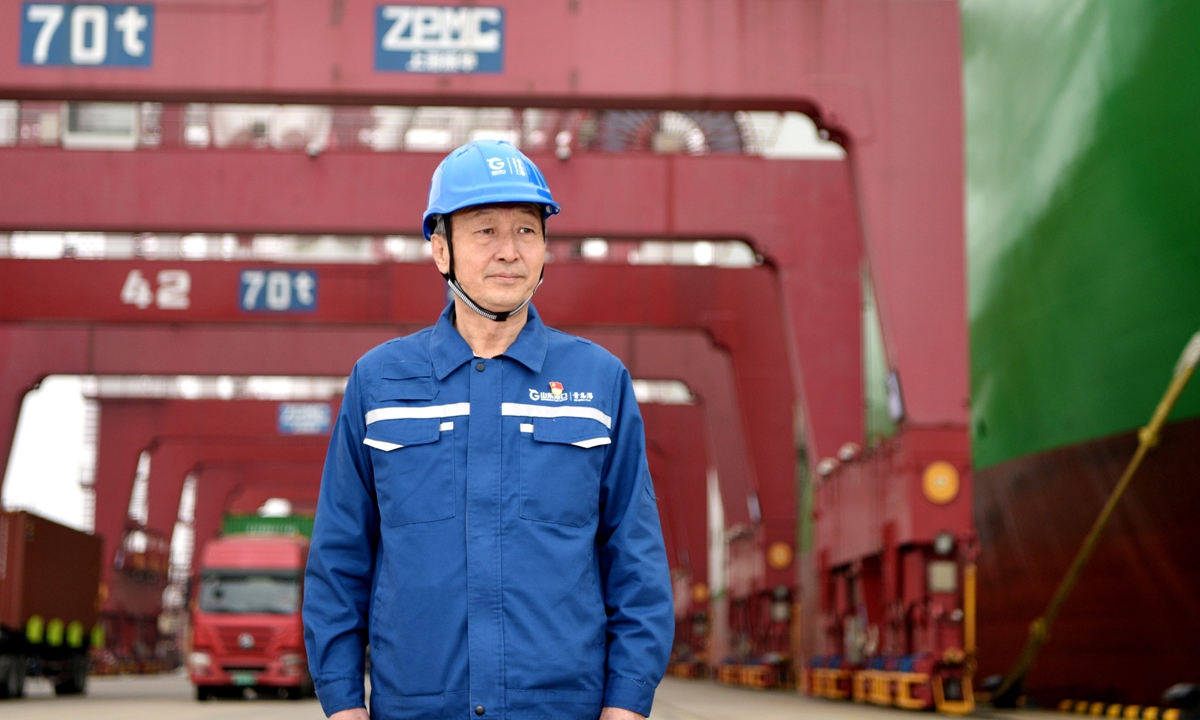
Xu Zhenchao Photo: Courtesy of Shandong Port Group, Qingdao Port
As the sun rises above the horizon, casting a golden hue over the bustling Qingdao Port in East China's Shandong Province, the air buzzes with the sounds of towering cranes and the ambitions of port workers. During the National Day holidays, over 4,000 technicians worked to optimize operations, enhancing berthing and loading efficiency for nearly 100 large cargo vessels from around the globe. With a sense of joy in refreshing operational efficiency, port workers at the fifth largest port in the world shared their commitment with Global Times during this traditionally busy holiday season.
For their idol, Xu, no matter how many world records he breaks or accolades he receives, his proudest identity remains that of "a qualified dockworker."
Recalling his first day of work at the Qingdao Port in 1974, Xu could still clearly remember his original aspiration: "Work hard and be a good worker."
Fifty years later, as he received recognition from China's top leader, with heartfelt sincerity, Xu assured the president that he would always stay true to the mission and continue nurturing a new generation of innovative technicians.
Xu was honored with a title that marks a historic milestone: He is the first technician in China to receive the national honor of the "People's Craftsman."
"This recognition underscores the value of the technical workers in our country, and I am proud to be part of the workforce," Xu told the Global Times.
Xu's journey from an ordinary dockworker with a middle school education to a leader in the modern industrial workforce highlights the essence of a "knowledge- and innovation-driven" nation in pursuit of advancements in science and technology.
In 1984, at the age of 34, Xu became one of the first container crane operators at the Qingdao Port, a crucial role that directly impacted shipping costs. During the 1980s and 1990s, Qingdao Port grappled with low operational efficiency, drawing criticism from foreign customers who complained that prolonged stay times were driving up their costs.
Xu recalled that in the past, when imported equipment broke down, everyone was accustomed to waiting for highly-paid foreign experts to come and fix it. During repairs, these experts would lock the doors to prevent port workers from learning their techniques. When some Chinese workers pushed back, these foreign specialists would assert, "Even if we were willing to teach, Chinese workers wouldn't be able to understand."
Determined to reverse this constraining predicament, Xu committed himself to studying the structure and principles of crane operation, and practicing his operational skills to boost work efficiency.
On April 27, 2003, his team set a world record by unloading 339 containers per hour, a feat dubbed "Zhenchao Efficiency." So far, they have broken the container unloading world record nine more times.
In 2011, the "Xu Zhenchao Skills Master Studio" was established at the port. Under his leadership, the team has filed 108 national patents and completed 998 technological innovation projects.
They notably converted container tire cranes from oil to electric power, addressing a significant industry gap, and achieved zero emissions at the port, setting a global benchmark.
At 74, Xu is still committed to cultivating young talents in the process of intelligent construction of the traditional container terminal at the Qingdao Port.
Xu always eagerly anticipates the annual skills competition, viewing it as a vital platform for promoting talent and motivating workers to enhance their skills. He takes pride in the improved educational backgrounds of recent participants, many of whom have surpassed the records of their predecessors.
"They are as determined to excel as I was in my time," he noted. "In this new era of rapid technological advancement, the opportunities available to tech talent to showcase their skills are expanding significantly."
A broader and brighter journey
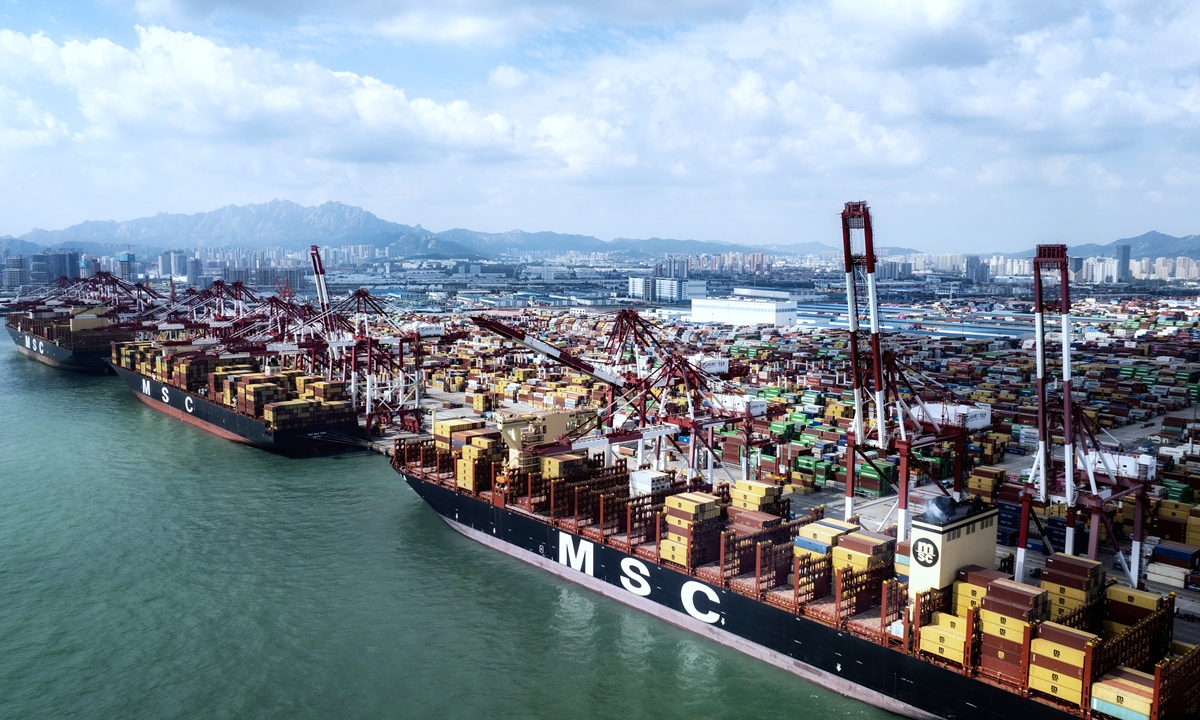
A view of the Qingdao Port on October 1, 2024 Photo: VCG
Profiling distinguished Chinese scientists and technologists like Xu, Huang, and Wang reveals a common thread: Their destinies are intertwined with that of their nation, marked by a relentless pursuit of self-reliance and resilience.
At the founding of the People's Republic of China, the nation had fewer than 50,000 scientific and technological personnel, with only about 600 focused on research. Today, China boasts the largest number of full-time research and development (R&D) personnel globally, along with the most comprehensive academic system and talent pool.
China has also made major headway in establishing a system of national laboratories and achieved fruitful results in developing core technologies in key fields. Substantial progress was made in the R&D of high-end equipment, such as aircraft engines, gas turbines, and 4th-generation nuclear power units. A stream of innovations emerged in frontier areas such as artificial intelligence (AI) and quantum technology. These achievements have further enhanced the country's capacity for innovation-driven development.
In July, China announced plans to deepen reforms in its scientific and technological system during the Third Plenary Session of the 20th Central Committee of the Communist Party. The strategy emphasizes education, talent, and innovation as essential for modernization, aiming to enhance resource mobilization for technological breakthroughs and integrate reforms across education, science, and human resources.
In Xu's studio, a down-to-earth yet inspiring message he penned captures the sentiments of countless Chinese workers: "Nation-building requires talent from all walks of life; it depends not only on scientists, but also on skilled workers. As a worker, you must master your craft, for you too can contribute to the nation."
From a young age, Xu has dreamed of becoming a scientist, drawn to astronomy and physics. Yet he and his colleagues have found profound fulfillment in their current roles.
"Workers are the builders of our nation, transforming scientists' grand visions into tangible realities. Whether scientists or workers, we are all making every effort to construct more world-class modern docks, record-breaking mountain tunnels, expansive bridges, making contributions to the Chinese path to modernization," Xu said.
